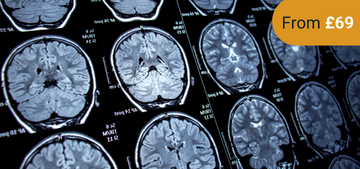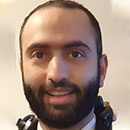European Board of Neurology Examination
EBN
 4.5 Star Rating
4.5 Star Rating
What is the European Board of Neurology Examination?
The European Board of Neurology Examination (EBN), is a standardised and comprehensive test, consisting of two parts: the oral examination (part 1) and the written examination (part 2). The exam is designed to evaluate the competence and expertise of neurologists across Europe in diagnosing and managing a wide range of neurological conditions. The EBN is jointly developed by the UEMS Section of Neurology, known as the European Board of Neurology and the European Academy of Neurology (EAN).
The written examination evaluates the application of knowledge in managing neurology-related matters. It includes a section where participants are not allowed to refer to any external sources. This section focuses on questions related to review papers specifically addressing the learning objectives outlined in Chapter 8A of the European Training Requirements in Neurology (ETRN). These papers are clearly defined and made available on the official website. The other part of the written exam comprises open-book questions, allowing participants to consult their own reference sources.
The oral examination assesses various CANMEDS competencies, including medical expertise, communication skills, advocacy for health, scholarly activities, and professionalism.
By taking this exam, you demonstrate your commitment to excellence in the field of neurology and your adherence to the highest professional standards. Individuals who pass the exam are also granted the title "Fellow of the European Board of Neurology (FEBN)", regardless of their geographic origin.
Our online study materials are trustworthy and effective, delivering a thorough set of practice MCQs that will help you become familiar with the exam's layout. With our support, you can develop the necessary skills and knowledge to confidently pass the EBN.
Frequently Asked Questions
The purpose of the oral examination is to evaluate candidates' abilities in presenting, communicating, discussing ethics and public health issues, and current scientific topics. To accommodate candidates who are non-native English speakers, language difficulties will be taken into consideration.
Candidates are required to submit three components for the oral examination: a clinical case presentation, a critical appraisal of a topic, and an essay on a public health or ethical issue. The topics for each submission must come from different fields.
Taking the European Neurology Examination offers several benefits. Firstly, it serves as evidence of outstanding performance and provides a unique identifier that could potentially boost the candidate's chances in the job application process within Europe.
Furthermore, by staying up to date and maintaining their knowledge of the latest developments, candidates who successfully pass the exam demonstrate their expertise within the field of neurology. In doing so, they showcase their commitment to continuous learning and their ability to adapt to the ever-evolving landscape of neurology in Europe. By actively engaging with European scientific societies and collaborating with fellow professionals, these candidates ensure that their skills and understanding align with the most recent advancements in the scientific community.
The European Board of Neurology does not mandate certificates as a prerequisite for taking this examination. However, it is expected that candidates have fulfilled the requirements of a national training programme, which includes a minimum of three years of clinical neurology training, after completing their basic training in general practice.
Candidates are only required to present identification documents on the day of the examination. It is recommended that applicants utilise the same identification documents for both their application and identification at the exam.
Benefits of our EBN Revision
491 Neurology MCQs
Feel confident for your European Board of Neurology Examination with our online question bank that's reflective of the EAN Curriculum.
Instant Answers & Feedback
Learn more than just the right answer by receiving further reading and a full explanation of answers to deepen your knowledge and understanding.
Frequently Updated
Our experts regularly review and add new Neurology MCQs to our question bank, so you'll receive the most up-to-date revision material available!
Reflective Revision
Compare peer responses, make online revision notes, submit your queries to our Resource Editor and benefit from unlimited resits.
24/7 Access
Learn around your busy schedule with 24/7 online access to our MCQ bank - all that's needed is an internet connection!
Specialist CPD
Demonstrate your capability by gaining a CPD Certificate on successful completion of our question bank.
Free Neurology EBN Sample Questions
No card details required! Simply create an account to access free EBN sample questions taken from this full-priced revision resource.
Topics Covered in our EBN Resource
This online question bank is designed to help candidates preparing for the written examination of the European Board of Neurology Examination (EBN), and is the first and largest resource of its kind. Consisting of 491 practice questions, this revision resource will allow you to identify your strengths and work on your areas for improvement, allowing you to prepare thoroughly for your EBN examination.
The question bank is divided into the following topics that mirror the specific learning objectives outlined in the 2021 European Training Requirements for Neurology Curriculum:
Cerebrovascular disorders
Cognitive disorders / dementias
Epilepsies and other paroxysmal disorders
Headache and facial pain
Immune-mediated diseases
Infections of the nervous system
Movement disorders
Neuro-emergency and intensive care
Neurological trauma
Neurologic manifestations and complications of non-primary neurological diseases / conditions and intoxications
Neuromuscular disorders
Neuro-oncology
Neuro-ophthalmology and neuro-otology
Neuropsychiatry and functional neurological disturbances
Neurorehabilitation / physical and rehabilitation medicine
Pain and neurological pain syndromes
Disturbances of circulation of Cerebrospinal Fluid (CSF)
Sleep-wake disorders
Spinal cord and roots disorders
EBN Resource Editor
EBN Resource Authors
Meet the authors who have contributed to our question bank so far! Our entire faculty have the right experience, qualifications and expertise that make them the perfect candidates to write high-quality, relevant material for our EBN revision.










